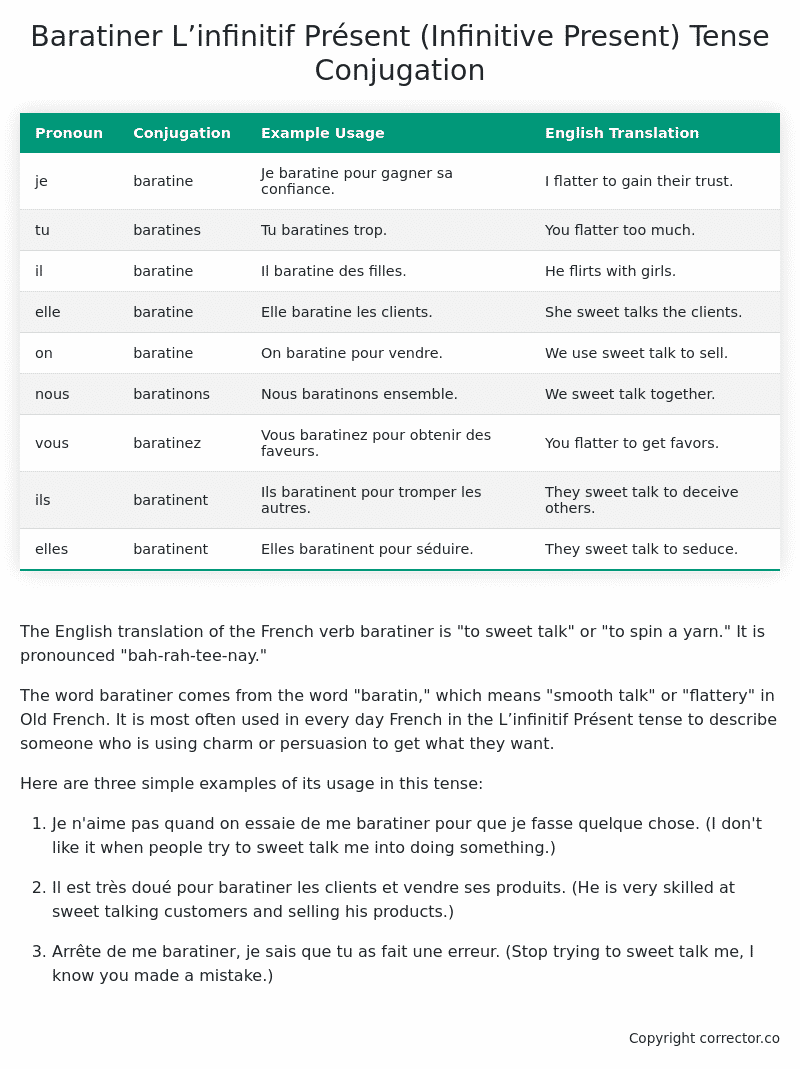L’infinitif Présent (Infinitive Present) Tense Conjugation of the French Verb baratiner
Introduction to the verb baratiner
The English translation of the French verb baratiner is “to sweet talk” or “to spin a yarn.” It is pronounced “bah-rah-tee-nay.”
The word baratiner comes from the word “baratin,” which means “smooth talk” or “flattery” in Old French. It is most often used in every day French in the L’infinitif Présent tense to describe someone who is using charm or persuasion to get what they want.
Here are three simple examples of its usage in this tense:
-
Je n’aime pas quand on essaie de me baratiner pour que je fasse quelque chose. (I don’t like it when people try to sweet talk me into doing something.)
-
Il est très doué pour baratiner les clients et vendre ses produits. (He is very skilled at sweet talking customers and selling his products.)
-
Arrête de me baratiner, je sais que tu as fait une erreur. (Stop trying to sweet talk me, I know you made a mistake.)
Table of the L’infinitif Présent (Infinitive Present) Tense Conjugation of baratiner
| Pronoun | Conjugation | Example Usage | English Translation |
|---|---|---|---|
| je | baratine | Je baratine pour gagner sa confiance. | I flatter to gain their trust. |
| tu | baratines | Tu baratines trop. | You flatter too much. |
| il | baratine | Il baratine des filles. | He flirts with girls. |
| elle | baratine | Elle baratine les clients. | She sweet talks the clients. |
| on | baratine | On baratine pour vendre. | We use sweet talk to sell. |
| nous | baratinons | Nous baratinons ensemble. | We sweet talk together. |
| vous | baratinez | Vous baratinez pour obtenir des faveurs. | You flatter to get favors. |
| ils | baratinent | Ils baratinent pour tromper les autres. | They sweet talk to deceive others. |
| elles | baratinent | Elles baratinent pour séduire. | They sweet talk to seduce. |
Other Conjugations for Baratiner.
Le Present (Present Tense) Conjugation of the French Verb baratiner
Imparfait (Imperfect) Tense Conjugation of the French Verb baratiner
Passé Simple (Simple Past) Tense Conjugation of the French Verb baratiner
Passé Composé (Present Perfect) Tense Conjugation of the French Verb baratiner
Futur Simple (Simple Future) Tense Conjugation of the French Verb baratiner
Futur Proche (Near Future) Tense Conjugation of the French Verb baratiner
Plus-que-parfait (Pluperfect) Tense Conjugation of the French Verb baratiner
Passé Antérieur (Past Anterior) Tense Conjugation of the French Verb baratiner
Futur Antérieur (Future Anterior) Tense Conjugation of the French Verb baratiner
Subjonctif Présent (Subjunctive Present) Tense Conjugation of the French Verb baratiner
Subjonctif Passé (Subjunctive Past) Tense Conjugation of the French Verb baratiner
Subjonctif Imparfait (Subjunctive Imperfect) Tense Conjugation of the French Verb baratiner
Subjonctif Plus-que-parfait (Subjunctive Pluperfect) Tense Conjugation of the French Verb baratiner
Conditionnel Présent (Conditional Present) Tense Conjugation of the French Verb baratiner
Conditionnel Passé (Conditional Past) Tense Conjugation of the French Verb baratiner
L’impératif Présent (Imperative Present) Tense Conjugation of the French Verb baratiner
L’infinitif Présent (Infinitive Present) Tense Conjugation of the French Verb baratiner (this article)
Struggling with French verbs or the language in general? Why not use our free French Grammar Checker – no registration required!
Get a FREE Download Study Sheet of this Conjugation 🔥
Simply right click the image below, click “save image” and get your free reference for the baratiner L’infinitif Présent tense conjugation!

Baratiner – About the French L’infinitif Présent (Infinitive Present) Tense
Forming the Infinitive Present
Common Everyday Usage Patterns
As a Verb’s Dictionary Form
After Modal Verbs
As an Imperative
In Infinitive Clauses
Interactions with Other Tenses
Present Tense
Future Tense
Conditional Tense
Passé Composé
Imperfect Tense
Subjunctive and Conditional Moods
Summary
Want More?
I hope you enjoyed this article on the verb baratiner. Still in a learning mood? Check out another TOTALLY random French verb conjugation!


